Partial Denture
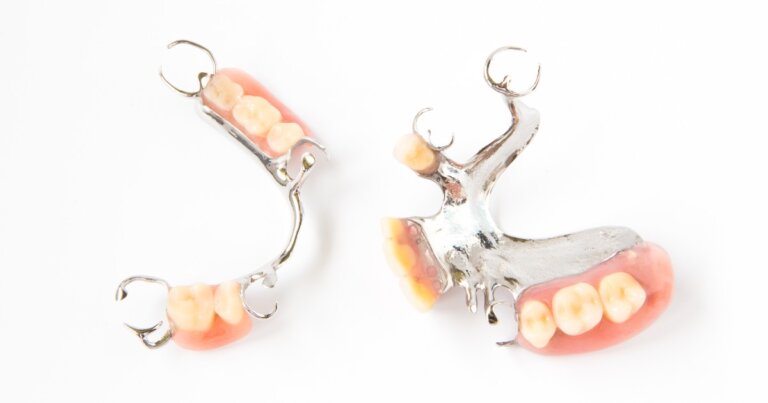
What Is A Partial Denture?
A Partial Denture is a removable denture appliance crafted to replace one or more missing teeth in either the upper or lower jaw. Unlike a complete denture that replaces an entire set of missing teeth, a partial denture is designed to fit in seamlessly among your remaining natural teeth. This customized prosthesis is an ideal choice for those who want to avoid more invasive treatments, such as dental implants or fixed bridges.
Before deciding on whether a Partial Denture are right for you, there are some things you should know:
- Who Needs A Partial Denture?
- What Are The Different Types Of A Partial Denture?
- What Are The Advantages Of A Partial Denture?
- What Are The Alternative Treatments If I Do Not Choose A Partial Denture?
- How Much Does A Partial Denture Cost?
- What Are The Steps In The Partial Denture Procedure?
- Can I Have A Partial Denture If I Am Pregnant?
- How Long Does A Partial Denture Last?
- What Are Common Problems with A Partial Denture?
If you have any further questions about A Partial Denture or other dental services offered at Atlas Dental, please contact us.

Free Phone Consultation
Have questions about cosmetic dentures for missing teeth? Book a free phone consult with our Toronto dentist

5 star google reviews
Our patients love their cosmetic looking denture smile! See for yourself why patients choose Atlas Dental.

Book a denture appointment online
We make custom fitted dentures to help our patients smile confidently again.
Who Needs A Partial Denture?
Partial dentures serve as an excellent dental solution for various individuals who have experienced tooth loss or have gaps in their smile. If you find yourself in any of the following situations, a partial denture might be the right choice for you:
- Missing Teeth: When one or more teeth are missing, it can lead to difficulties in chewing, speech impediments, and a lack of confidence in your appearance. A partial denture can fill these gaps, restoring your ability to eat comfortably and speak clearly.
- Preserving Natural Teeth: Preserving the integrity of your remaining natural teeth is crucial for maintaining oral health. If you have a few missing teeth and leave the gaps untreated, it can cause the adjacent teeth to shift and move, potentially leading to alignment issues and bite problems. A partial denture prevents this movement, supporting the adjacent teeth and keeping them in their proper positions.
- Affordable Tooth Replacement: Compared to dental implants or fixed bridges, partial dentures are a more cost-effective tooth replacement option. They offer an affordable solution to replace missing teeth without compromising on functionality or aesthetics.
- Non-Candidates for Dental Implants: Some individuals may not be suitable candidates for dental implants due to factors such as inadequate bone density or certain medical conditions. In such cases, a partial denture can be an excellent alternative for restoring their smile and oral function.
- Temporary Tooth Replacement: If you are undergoing a dental treatment plan that involves multiple steps, a partial denture can serve as a temporary tooth replacement until the permanent solution, like a dental implant, can be placed.
- Improved Aesthetics: A partial denture not only restores missing teeth but also enhances the aesthetics of your smile. The prosthesis is custom-made to match the color, shape, and size of your existing teeth, creating a natural and seamless appearance.
- Boosted Self-Confidence: Regaining your smile can have a significant impact on your self-confidence and overall well-being. With a partial denture, you can confidently interact with others without worrying about hiding your missing teeth.
It’s essential to consult with a qualified dentist or prosthodontist to determine if a partial denture is the right choice for your specific dental needs. They will conduct a comprehensive examination of your oral health, discuss your treatment goals, and help you make an informed decision about the most suitable tooth replacement option. If you have further questions about Partial Dentures, please contact us.
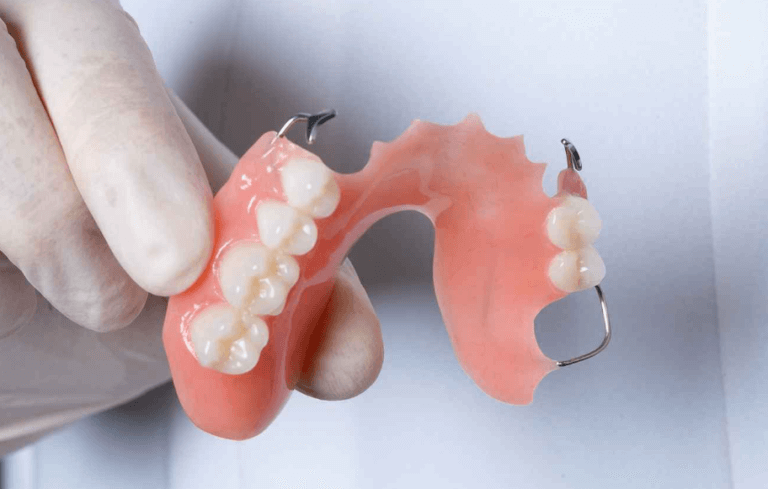
What Are The Different Types Of Partial Dentures?
Partial dentures come in various types, each catering to specific dental needs and preferences. Let’s explore the different options available:
- Acrylic Partial Denture: Acrylic partial dentures are a common and cost-effective choice for replacing one or more missing teeth. They consist of a pink-colored acrylic base that mimics the gum tissue and supports replacement teeth made of acrylic or porcelain. These dentures are easily removable, making them convenient for cleaning and maintenance. While acrylic partial dentures are less durable compared to other options, they are a popular choice for temporary or immediate tooth replacement.
- Cast Metal Partial Denture: Cast metal partial dentures are a sturdier and more long-lasting option. They feature a metal framework made from cobalt-chromium alloy, which provides excellent support and stability. The metal framework is custom-made to fit snugly around the remaining teeth, and artificial teeth are attached to it. Cast metal partial dentures are thin, comfortable, and less bulky compared to acrylic dentures. They are ideal for individuals who need a durable, permanent tooth replacement solution.
- Single Tooth Partial Denture: Also known as flipper dentures, a single tooth partial denture is designed to replace just one missing tooth. This type of denture is ideal when there is only a single gap in the dental arch, and the surrounding natural teeth are healthy and strong.
- Essix Denture: An Essix denture is a clear, transparent, and removable partial denture that uses a vacuum-formed template to fit snugly over the remaining teeth. It is made from a strong and flexible polyethylene material, making it less noticeable when worn. The area of the missing tooth is painted in with a tooth-colored paint. Essix dentures are commonly used for temporary tooth replacement, especially after orthodontic treatments like braces or aligners. They are not as durable as other types of partial dentures and may not be suitable for long-term use.
- Valplast Denture: Valplast dentures are a flexible and comfortable option for tooth replacement. They are made from a flexible nylon-like material that blends naturally with the surrounding tissues. Valplast dentures are metal-free and have no visible clasps, making them an aesthetically appealing choice. Their flexibility allows for easy adjustment and increased comfort, making them an excellent option for patients with allergies to traditional denture materials.
The choice of the most suitable partial denture depends on factors such as the number of missing teeth, the condition of the surrounding teeth, budget considerations, and personal preferences. It is essential to consult with a skilled dentist or prosthodontist who can assess your specific dental needs and recommend the best partial denture option to restore your smile and oral functionality effectively. If you have further questions about Partial Dentures, please contact us.
What Are The Advantages Of A Partial Denture?
Partial dentures offer numerous benefits, making them a popular choice for individuals with missing teeth. Here are some of the key advantages of opting for a partial denture:
- Improved Chewing Functionality: Missing teeth can make it challenging to chew and properly process food. With a partial denture, you can regain your ability to chew effectively, allowing you to enjoy a diverse and nutritious diet.
- Enhanced Speech: Gaps in your smile can affect your speech, leading to difficulties in pronunciation and articulation. A partial denture fills these spaces, helping you speak clearly and confidently.
- Natural Aesthetics: Partial dentures are custom-made to match the color, shape, and size of your existing teeth, providing a natural and seamless appearance. They blend in so well that others may not even realize you are wearing a dental prosthesis.
- Prevents Teeth Shifting: When there are gaps left by missing teeth, the adjacent teeth can start to shift and move, affecting your bite and overall dental alignment. A partial denture helps maintain the proper position of your remaining teeth and prevents any undesirable shifting.
- Affordable Tooth Replacement: Compared to dental implants and fixed bridges, partial dentures are a more budget-friendly tooth replacement option, making them accessible to a wider range of patients.
- Minimally Invasive: Getting a partial denture typically involves a minimally invasive procedure. Unlike dental implants, which require surgery and healing time, partial dentures are non-invasive and can be fabricated relatively quickly.
- Versatility: Partial dentures can be customized to accommodate various dental situations, whether you are missing one tooth or several. The flexibility in design allows for a tailored solution that meets your specific needs.
- Comfortable Fit: Modern partial dentures are made using advanced materials and technology, ensuring a comfortable fit and reduced irritation to the oral tissues.
- Quick Results: Once the design and fabrication process is complete, you can receive your partial denture relatively quickly, allowing you to enjoy the benefits of a restored smile in a timely manner.
- Temporary or Permanent Solution: Depending on your individual situation, partial dentures can be used as a temporary or permanent tooth replacement option, providing flexibility to meet your evolving dental needs.
It’s important to note that while partial dentures offer many advantages, they may not be the best choice for everyone. Some individuals may benefit more from other tooth replacement options, such as dental implants or fixed bridges. It is essential to consult with a qualified dentist who can assess your oral health, discuss your goals, and recommend the most suitable treatment plan for your specific case. If you have further questions about Partial Dentures, please contact us.
What Are The Alternative Treatments If I Do Not Choose A Partial Denture?
While partial dentures offer numerous benefits for replacing missing teeth, they are not the only option available. Depending on your dental condition, treatment preferences, and budget, you might consider the following alternative treatments:
- Dental Implants: Dental implants are a popular and permanent solution for replacing missing teeth. They involve the surgical placement of titanium posts into the jawbone, acting as artificial tooth roots. Once the implants integrate with the bone (osseointegration), custom-made crowns are attached to the implants, providing natural-looking and fully functional replacement teeth. Dental implants offer exceptional stability, preserve jawbone health, and look and feel like real teeth. They are an excellent option for individuals seeking a long-lasting and durable tooth replacement solution.
- Dental Bridges: A dental bridge is a fixed dental restoration used to replace one or more missing teeth. It consists of one or more artificial teeth (pontics) held in place by dental crowns attached to the adjacent healthy teeth. Dental bridges are a sturdy option that can provide aesthetic and functional benefits. However, to support a bridge, the neighboring teeth need to be prepared by removing some enamel, which can be a downside for those with otherwise healthy teeth.
- No Treatment: Opting for no treatment is an alternative, but it comes with potential consequences. Leaving gaps from missing teeth untreated can lead to several issues. The adjacent teeth may start shifting, causing misalignment and affecting your bite. Moreover, the loss of bone density in the jaw can occur over time, leading to further oral health complications. Not seeking treatment may also impact your self-confidence, as you might feel self-conscious about your smile.
Each alternative treatment has its own set of advantages and considerations, so it is crucial to discuss your specific dental needs and preferences with your dentist. They will evaluate your oral health, explain the pros and cons of each option, and help you make an informed decision that aligns with your goals and budget. If you have further questions about Partial Dentures, please contact us.
Cost of Partial Dentures
Partial Dentures can vary widely in cost depending on several factors, including the type of partial denture, whether it is for the upper or lower jaw, the materials used, and the location of the dental practice. Therefore, depending on the type of denture you are looking for, the cost can range from $462 to $1419 plus dental lab fee. The codes relevant to dentures in the Ontario Dental Association’s Suggested Fee Guide appear as follows:
Dentures, Partial, Acrylic Base (Provisional) (With or Without Clasps). (e.g. Single Tooth Dentures, Essix Dentures)
- 52101 – Maxillary: $462 + Dental Lab Fee
- 52102 – Mandibular: $462 + Dental Lab Fee
Dentures, Partial, Polymer, Resilient Retainer. (e.g. Valplast Flexible Partial Dentures)
- 52201 – Maxillary: $678 + Dental Lab Fee
- 52202 – Mandibular: $678 + Dental Lab Fee
Dentures, Partial, Acrylic, With Metal Wrought/Cast Clasps and/or Rests. (e.g. Acrylic Partial Dentures)
- 52301 – Maxillary: $775 + Dental Lab Fee
- 52302 – Mandibular: $775 + Dental Lab Fee
Dentures, Partial, Free End, Cast Frame/Connector, Clasps and Rests. (e.g. Cast partial Dentures)
- 53101 – Maxillary: $1419 + Dental Lab Fee
- 53102 – Mandibular: $1419 + Dental Lab Fee
Dentures, Partial, Tooth-Borne, Cast Frame/Connector, Clasps and Rests. (e.g. Cast partial Dentures)
- 53201 – Maxillary: $1319 + Dental Lab Fee
- 53202 – Mandibular: $1319 + Dental Lab Fee
Partial Dentures are sometimes considered a supplementary service by dental insurance plans and may or may not be covered by your dental insurance. Be sure to find out from your dental insurance plan provider how much you are eligible for before going ahead with dental treatment. Your dentist can help you submit an predetermination to your dental insurance. Our fees are consistent with the ODA Fee Guide.
For patients without dental insurance, Atlas Dental is pleased to offer dental financing through Dentalcard. Affordable payment plans start at 7.95% for terms of 6 months to 6 years. To learn more about Dentalcard dental treatment financing, follow this link.
What Are The Steps In The Partial Denture Procedure?
The process of getting a partial denture involves several steps, from the initial consultation to the final placement of the prosthesis. Let’s walk through the typical procedure for getting a partial denture:
- Initial Consultation: The first step is to schedule an appointment with a dentist for a thorough examination of your oral health. During this consultation, the dental professional will assess the condition of your teeth, gums, and jawbone, as well as discuss your treatment goals and preferences.
- Treatment Planning: Based on the examination results and your dental needs, the dentist will develop a personalized treatment plan. They will explain the different types of partial dentures available and help you choose the most suitable option for your situation.
- Taking Impressions: To create a custom-fit partial denture, the dentist will take precise impressions of your teeth and gums. These impressions serve as a mold for designing the denture, ensuring a comfortable and accurate fit. Please review these denture pre-visit instructions before your appointment.
- Denture Design and Fabrication: Using the impressions as a guide, a dental laboratory will craft the partial denture. Skilled technicians will carefully construct the prosthesis, incorporating the specific features to match your existing teeth and provide optimal functionality.
- Try-In Appointment: Once the partial denture is fabricated, you will have a try-in appointment. During this visit, the dentist will check the fit, shape, and color of the denture to ensure it aligns perfectly with your natural teeth and gums. Any necessary adjustments will be made at this stage.
- Final Placement: After any adjustments are completed, your dentist will place the final partial denture. They will carefully position it in your mouth and check that it fits comfortably and securely. The dentist will also provide denture post-insertion instructions on how to insert and remove the denture properly, as well as how to care for it.
- Follow-Up Visits: After receiving your partial denture, you will have follow-up appointments to ensure that the denture fits well and functions correctly. Your dentist may make additional adjustments if needed, especially in the initial period of wearing the denture.
- Regular Checkups and Maintenance: Regular dental checkups are essential to monitor the condition of your partial denture and ensure it continues to fit properly. Your dentist will also provide guidance on maintaining and cleaning the denture to ensure its longevity and hygiene.
By following these steps and working closely with your dental professional, you can achieve a well-fitting and functional partial denture that seamlessly integrates with your natural smile. Remember that proper care and maintenance of your partial denture are crucial for ensuring its longevity and preserving your oral health. If you have further questions about Partial Dentures, please contact us.
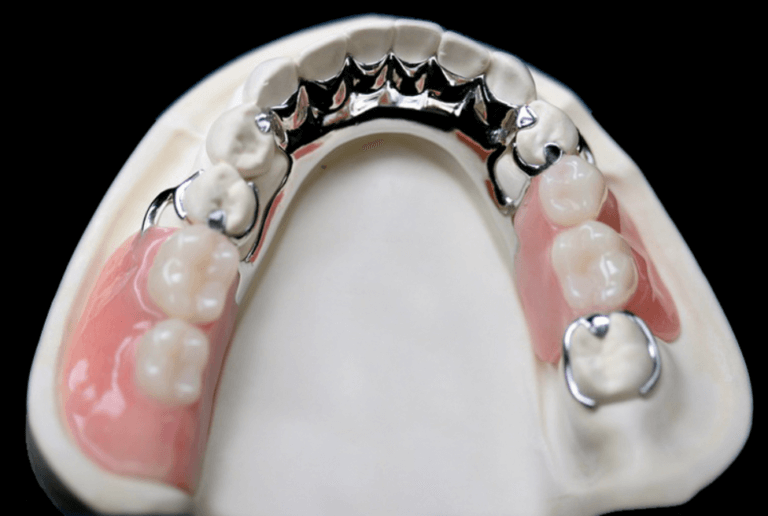
Can I Have A Partial Denture If I Am Pregnant?
Pregnancy is a unique and special time in a woman’s life, and taking care of oral health during this period is essential for both the mother and the baby. Many dental treatments are safe during pregnancy, but certain factors need consideration when it comes to getting a partial denture. Here’s what you should know about having a partial denture if you are pregnant:
- Consultation with Your Dentist: If you are pregnant and considering a partial denture, it is crucial to inform your dentist about your pregnancy during your initial consultation. This information allows the dentist to tailor the treatment plan and choose the safest approach for your specific situation.
- Timing of Treatment: Pregnancy, particularly the first and third trimesters, can be sensitive periods for dental treatments due to potential risks involved. Elective dental procedures, such as getting a partial denture for cosmetic purposes, are often best postponed until after delivery. However, if there is a pressing need to replace missing teeth or address oral health issues, your dentist may recommend the most appropriate and safe course of action during pregnancy.
- Local Anesthetics and X-Rays: During pregnancy, avoiding unnecessary exposure to medications and X-rays is advisable. However, local anesthetics are generally considered safe for dental procedures, as long as they do not contain epinephrine. Your dentist will use an anesthetic that is safe for use during pregnancy.
- Considering Alternatives: If the timing of the partial denture treatment is not ideal during your pregnancy, your dentist may suggest temporary solutions or alternative treatments that can be safely done during this period. These temporary measures can provide relief until a more comprehensive treatment can be pursued after delivery.
- Oral Health and Pregnancy Outcomes: Research suggests that maintaining good oral health during pregnancy is linked to better pregnancy outcomes. Poor oral health has been associated with an increased risk of preterm birth and low birth weight. Thus, it is essential to prioritize your oral health and work with your dentist to develop a suitable dental care plan during pregnancy.
Having a partial denture during pregnancy is possible, but it requires careful consideration and communication with your dentist. Your dental professional will take into account your unique situation and ensure that any treatment provided is safe for both you and your developing baby. If you have further questions about Partial Dentures, please contact us.
How Long Does A Partial Denture Last?
On average, a well-maintained partial denture can last anywhere from 5 to 10 years or even longer. The lifespan of a partial denture can vary depending on several factors, including the quality of the materials used, how well it is cared for, and changes in your oral health over time:
- Material Quality: Partial dentures made from high-quality materials tend to last longer. Dentures crafted from durable acrylics, metal alloys, or flexible materials like Valplast are designed to withstand the pressures of everyday use and resist wear.
- Oral Habits: Certain habits, such as grinding or clenching your teeth (bruxism), can put extra stress on the denture and accelerate its wear. If you have bruxism, your dentist may recommend a night guard to protect the denture and extend its lifespan.
- Changes in Oral Anatomy: Over time, your mouth’s shape and size may change due to natural aging, weight loss or gain, or dental issues. These changes can affect the fit of your partial denture and may require adjustments or a new denture to ensure a comfortable and secure fit.
- Proper Care and Maintenance: Regular and proper care is essential to prolonging the life of your partial denture. Cleaning the denture daily, removing it before sleeping, and following your dentist’s care instructions can help prevent damage and maintain its appearance and functionality.
- General Wear and Tear: Even with diligent care, partial dentures can experience normal wear and tear over the years. Chewing, speaking, and other everyday activities can gradually wear down the denture’s artificial teeth and base material.
- Regular Dental Checkups: Visiting your dentist regularly allows for the early detection of any potential problems with your partial denture. Your dentist can address issues promptly, preventing further damage and helping to extend the denture’s lifespan.
It is essential to remember that while partial dentures are durable, they are not meant to last a lifetime. As the denture ages, it may become less effective in function and aesthetics. If you notice significant wear, discomfort, or if the denture no longer fits properly, it’s time to consult your dentist. If you have further questions about Partial Dentures, please contact us.
What Are Common Problems with A Partial Denture?
While partial dentures are a reliable solution for replacing missing teeth, they may occasionally encounter some issues that can affect their fit, function, and overall comfort. Understanding these common problems can help you identify and address them promptly. Here are some of the typical challenges associated with partial dentures:
- Sore Spots and Discomfort: In the initial stages of wearing a partial denture, you may experience sore spots or discomfort as your mouth adjusts to the new appliance. These areas of irritation can usually be relieved with adjustments made by your dentist.
- Loose Fit: Over time, changes in the shape of your mouth or natural wear and tear can lead to a loose fit of the partial denture. A loose denture may cause discomfort, difficulty in chewing, and even lead to sores. Regular dental checkups can help detect and address this issue promptly.
- Difficulty in Chewing and Speaking: Some patients may initially find it challenging to eat and speak with a partial denture. This difficulty is usually temporary, and with practice, you can regain your ability to perform these activities effectively.
- Gum and Tissue Irritation: If the partial denture is not properly fitted or if it moves excessively, it can cause irritation to the gums and surrounding oral tissues. This can lead to sore spots or inflammation, which requires dental attention.
- Accidental Damage: Partial dentures are susceptible to accidental damage, such as fractures or chips, especially if dropped or mishandled. If any damage occurs, consult your dentist immediately for repair or replacement.
- Unstable Fit and Movement: If the partial denture lacks adequate support or retention, it may move or shift during eating or speaking, causing discomfort and embarrassment.
- Changes in Oral Anatomy: As mentioned earlier, changes in your mouth’s shape or size can affect the fit of the partial denture over time. This may require adjustments or relining to maintain a proper fit.
- Allergic Reactions: Some individuals may experience allergic reactions to the materials used in partial dentures, such as certain metals or acrylics. If you notice any unusual reactions, inform your dentist immediately.
- Denture Odor: Inadequate cleaning of the partial denture can lead to the buildup of food particles and bacteria, resulting in unpleasant odors. Regular cleaning and proper denture care can prevent this problem.
- Discoloration and Staining: Like natural teeth, partial dentures can accumulate stains and discolorations over time, particularly if not cleaned regularly. Denture cleaning solutions and proper hygiene practices can help maintain the denture’s appearance.
It’s essential to address any issues with your partial denture promptly to ensure its longevity and your oral health. If you encounter any of the above problems or experience discomfort with your partial denture, schedule an appointment with your dentist. They will assess the denture, make necessary adjustments or repairs, and provide guidance on proper care. If you have further questions about Partial Dentures, please contact us.
We also think you’ll like…
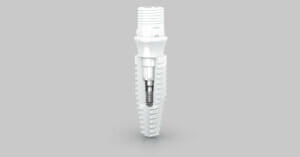
Zirconia Dental Implants
Zirconia Dental Implants What Are Zirconia Dental Implants? Zirconia dental implants are an alternative to traditional titanium dental implants for replacing missing teeth. Unlike titanium
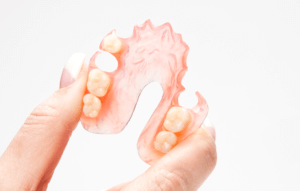
Valplast Flexible Partial Denture
Valplast Flexible Partial Denture What Is A Valplast Flexible Partial Denture? A Valplast Flexible Partial Denture is a type of removable partial dental prosthesis specifically
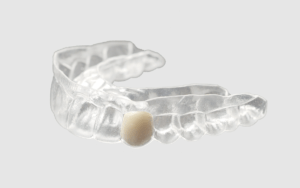
Essix Denture
Essix Denture What Is An Essix Denture? Essix Dentures are a type of removable denture crafted from transparent or translucent material, commonly known as polyethylene
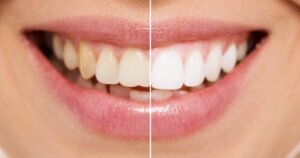
Smile Makeover
Smile Makeover What Is a Smile Makeover? A confident smile can brighten up a room and leave a lasting impression. It is a reflection of
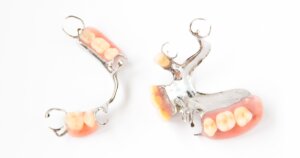
Dentures
Dentures What Are Dentures? Dentures are removable oral appliances designed to replace missing teeth and surrounding tissues. They are custom-made to fit comfortably in your
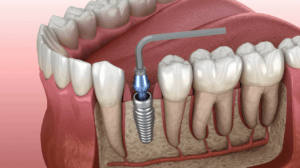
Immediate Dental Implant Placement
Immediate Dental Implant Placement What Is Immediate Dental Implant Placement? Immediate Dental Implant Placement is a revolutionary approach towards dental implants that offers numerous advantages

